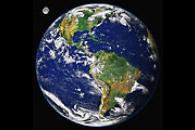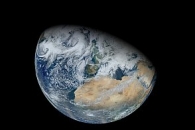But your weight would change in each of these situations. Weight is the measurement of the gravitational pull on an object.
If you weigh 100 pounds on Earth, you would weigh 16.6 pounds on the moon. It is possible that you could jump and be launched into space. The gravity on the moon is approximately a fifth of that of Earth and there is no atmosphere to penetrate. The lunar rover's maximum speed was 5 mph to prevent an accidental launching of the rover as it went up a hill.
The most massive planet is Jupiter, so it would exert the strongest gravitational pull. If you weighed 100 lbs on Earth, you would weigh 236.4 lbs on Jupiter. You would probably not be able to lift your arm.
One problem for astronauts living in an weightless environment is that their muscles atrophy. There is no gravity to create resistance to work against.
Your weight on Saturn would be 91.6 pounds if you weigh 100 pounds on Earth. Imagine you could fill a bowl with water that would be large enough to hold Saturn. Saturn would float. Even though Saturn is very large, it is not very dense. It is a large snowball in space. A snowball made up of 94 percent hydrogen, 6 percent helium and a small amount of ammonia and methane. It is theorized that Saturn has a rocky core about the size of the Earth. The mass of Saturn is slightly less than that of the Earth. But it's diameter is ten times greater not counting it's rings.
The sun contains 99.9 percent of the matter in our solar system. The diameter of the sun is 100 times greater than the Earth. Your weight of 100 pounds on Earth would be 2707 pounds. If you could wear a fire proof, pressure proof suit, You could not life your big toe much less your body.
Calculator of your Weight on another planet.
The is no planet B folks. Let's take care of it. And yes, your weight would be very slightly less 2 miles above sea level on a very high mountain. There is less gravity.
 |
| NASA photo |
 |
| NASA photo |

Hi Ann - science is fascinating ... so thank you for giving us examples of weight and mass - I guess I'll stay as I am here on earth ... cheers Hilary
ReplyDeletehttp://positiveletters.blogspot.co.uk/2017/04/m-is-for-melton-mowbray-market-national.html
A lesson in basic science which many may have forgotten or even may not even know about. Thanks for sharing Ann! How's the going Ma'am?
ReplyDeleteHank
Right, I am taking my bathroom scales and moving to a lesser known peak in the Himalayas :)
ReplyDeleteThis made for lovely reading - took me back to my schooldays.
I love discussing weight and mass! Fun comparisons, too!
ReplyDeleteM is for Money